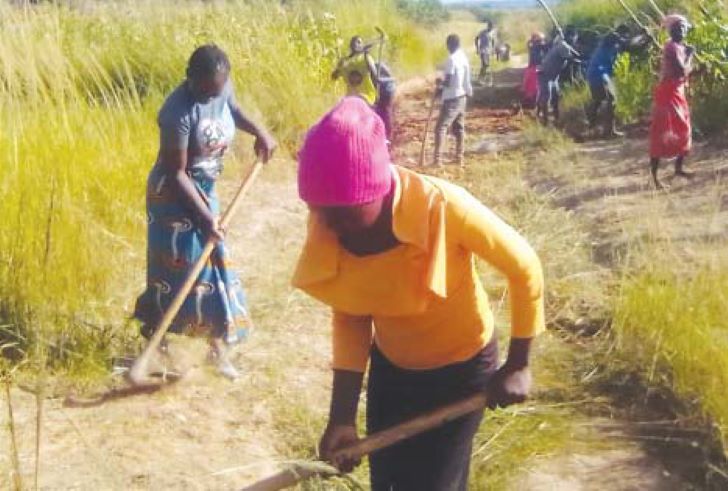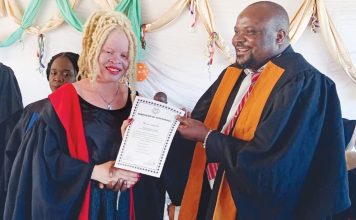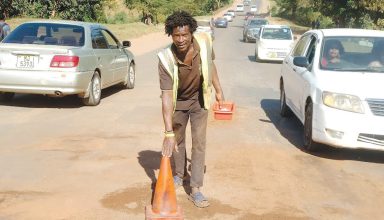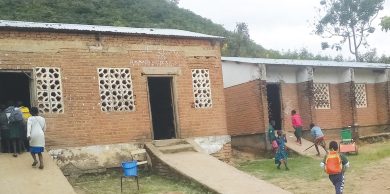Mzimba resumes self-help
It is 6am on a chilly Friday in Amon Moyo Village, Traditional Authority Mzikubola in Mzimba District.
Hundreds of people have teamed up to clear weeds, patch roads and repair broken bridges.

This is not paid-up work, but voluntary.
The villagers conceived the self-help initiative in a return to basics and desperation to uplift their community.
“It’s a first since the dawn of democracy in 1993. We last did this during the Youth Week in the one-party rule,” recalls group village head (GVH) Amon Moyo.
The zeal for communal self-help projects has waned for the past three decades of democracy.
Low community participation in development initiatives is telling in rural areas, where 84 percent of Malawians live, according to the 2018 census.
Communities that used to work happily for free now expect to be paid for making their settings better places to live in.
The Ministry of Gender, Community Development and Social Welfare has set aside May as a Community Development Month to reverse the deepening dependency syndrome.
The Malawi 2063 national vision and the global Sustainable Development Goals promote self-reliance and inclusive participation to create a better world for all.
Both rural and urban areas have lined up priority projects for the Community Development Month.
The turnout in Mzimba is on the rise despite the resistance encountered last year.
“It was the first time and some thought it was a violation of their rights,” says GVH Moyo
According to the ministry, self-help spirit initiatives in local communities have dwindled due to the misconception of voluntary work as the return of thangata (forced labour).
The policymakers fault Malawians for mistaking democracy for the right not to work and depend on hand-outs from the government and its partners.
However, Moyo says people in 14 villages under his authority lacked awareness.
Since April 1, they have met every Tuesday and Friday from 6 am to 10 am to do communal work.
“If someone gets ill, will we summon government officials from Capital Hill to come and clear the road for us to take the patient to the nearest hospital?” asks Moyo, 61.
The GVH believes that development follows good roads.
Daphnie Ngoma, 54, wishes the community had started volunteering earlier.
She fondly remembers an era when village heads were sending criers to rally people for communal works like clearing weeds from public roads and water points.
“Such works improve our way of living. Roads and bridges are a lifeline to vital services such as markets, schools, health facilities and water points,’’ says Moyo.
Village head Nthambula Chisi says communal work strengthens togetherness.
“While working, we know each other and bond as was the case in the good ole days. Everyone plays a part,” says the 70-year-old community leader.
Luviri Ward councillor Joel Nkhata says the volunteering locals are gradually enhancing the quality of life in their communities.
“Access to various destinations has improved, primary schools that lacked toilets now have them and once impassable bridges are now passable,” he says.
M’Mbelwa District Council principal community development officer Topsy Kachere says unity is a strength.
“The council commends communities for embracing the self-help initiatives. There is strength in pooling resources and energy for the common good,” he says.
Ten of the 404 village development committees (VDCs) in Mzimba have rolled out 200 projects in the past two years.
“This year, 173 VDCs are participating. They have planned 555 projects,” Kachere states.
They include repairing earth roads, moulding bricks as well as construction of teachers’ houses, school toilets and community-based childcare centres.
Others include forest regeneration and irrigation initiatives.
“Villages use different approaches and the council only motivates them. We don’t force them. We only work with interested communities,” Kachere says.
He hails local development committees for leading the march out of dependency.
“The involvement of everyone, especially traditional and religious leaders has been vital to shake off the dependency syndrome fuelled by NGOs that think giving allowances increases participation,” Kachere says.
He urges government agents and non-governmental organisations to ensure Malawians understand the power of self-help activities.
“We are not saying people shouldn’t get an allowance, but help them understand why they are getting it,” the officer contends
He says if that information is not properly relayed, it is a big problem for a person from the village as most of them, do not even know the meaning of an allowance.
Mzimba Civil Society Organisations Network chairperson Christopher Melele says the resurgence of volunteerism could be a game changer in community development.
“It instils the spirit of hard work, integrity and patriotism which contribute to community ownership and sustainability of the projects,” he says.





